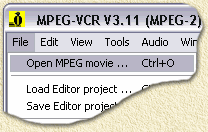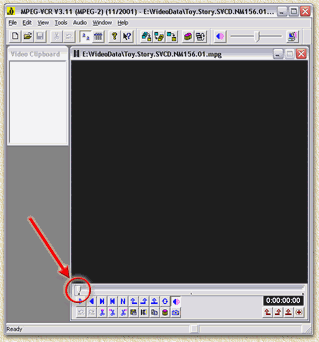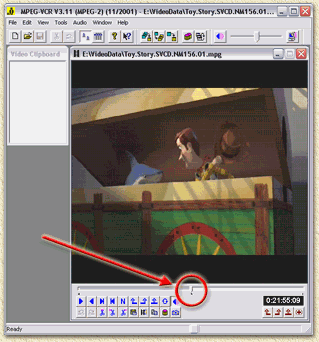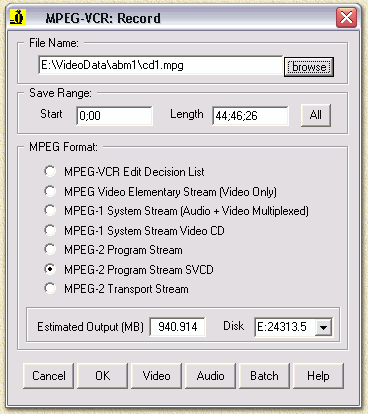
| Print this page - use Landscape |
Search the WeetHet Pages |
|||||||
| WeetHet is being updated! - Current articles will slowly move to www.tweaking4all.com For excellent webhosting that is reliable and affordable, we highly recommend: LiquidWeb |
||||||||
|
On this page ...
Before we start ... what do we need? Well, naturally at least a MPEG-1 or MPEG-2 file. Note: MPEG2VCR supports transcoding to a different format - the result is not always perfect and it takes a lot of time ... You will also need MPEG2VCR or MPEG1VCR by Womble MultiMedia. You can download a trial version at their website - this can be down in the download section or in the purchase section (you don't need to buy it instantly, just download the file). MPEG1VCR is actually pretty cheap ($45 at the time of writing) and suitable for editing MPEG1 files (VideoCD format). MPEG2VCR is a bit more expensive ($249) but allows you to edit MPEG2 and MPEG1 files (VCD, SVCD and DVD format). Install the either of these programs (MPEG1VCR for MPEG1 or MPEG2VCR for MPEG1/MPEG2). Cutting a movies into pieces In this example I assume we have one MPEG-2 file, which we would like to cut into two pieces. Note: we're not actually "cutting" the movie into pieces. It's more that we make two or more copies of a part of a movie. Step 1: Start MPEG2VCR We use MPEG2VCR since we are dealing with MPEG-2 files.
Step 3: Select the start position of the movie clip Use the slider (indicated below by the red arrow in the screenshot below) to select your starting position (usually this is the absolute beginning of the movie, but this can be any given position you like). Optionally you can manually enter a time in the TimeCode section (on the right, below the movie clip). Once you are pleased with your select, click the "MarkIn"
button (
Step 4: Move the slider to the end position of the movie clip The same slider we used in Step 3 is now used to mark the end position of the first part to be cut from this movie. Optionally you can manually enter a time in the TimeCode section (on the right, below the movie clip). Once you've found the position where you would like
to end, press the "MarkOut" button (
Step 5: [OPTIONAL] Write down the time code (only needed if you want to cut a movie into multiple parts!)
Step 6: Saving the result. Now it's time to copy this movie clip to
a file. Click the "Record" button (
Using the "Browse" button you can select the destination filename. Don't worry about the "MPEG format" part of this window, since Womble with set the proper format for you (not damaging the original format). Click "OK" and with a few minutes Womble will have cut the first part of your movie (The original file will NOT be damaged!). If you decide to select a different format, Womble MPEG2VCR will transcode the file, however it takes time (Womble is fast!) and you might want to check audio/video synchronisation as I experienced that audio quickly runs out of sync. The video quality is rather poor too. Note: the buttons "video" and "audio" offer detailed settings ... Step 7: The next CUT ... If you started cutting the movie to get multiple parts, then repeat Step 3 to Step 7 until you're done cutting the movie. For Step 3, use the END time (you did write it down in Step 5, didn't you?) of the previous cut as a BEGIN time. Tip: When creating a movie that spans multiple disc, it might be pleasant for the viewer to see the last few seconds of the previous movie clip being repeated on the next disc (for example when swapping disc usign VideoCD or Super VideoCD). |
||||||||






